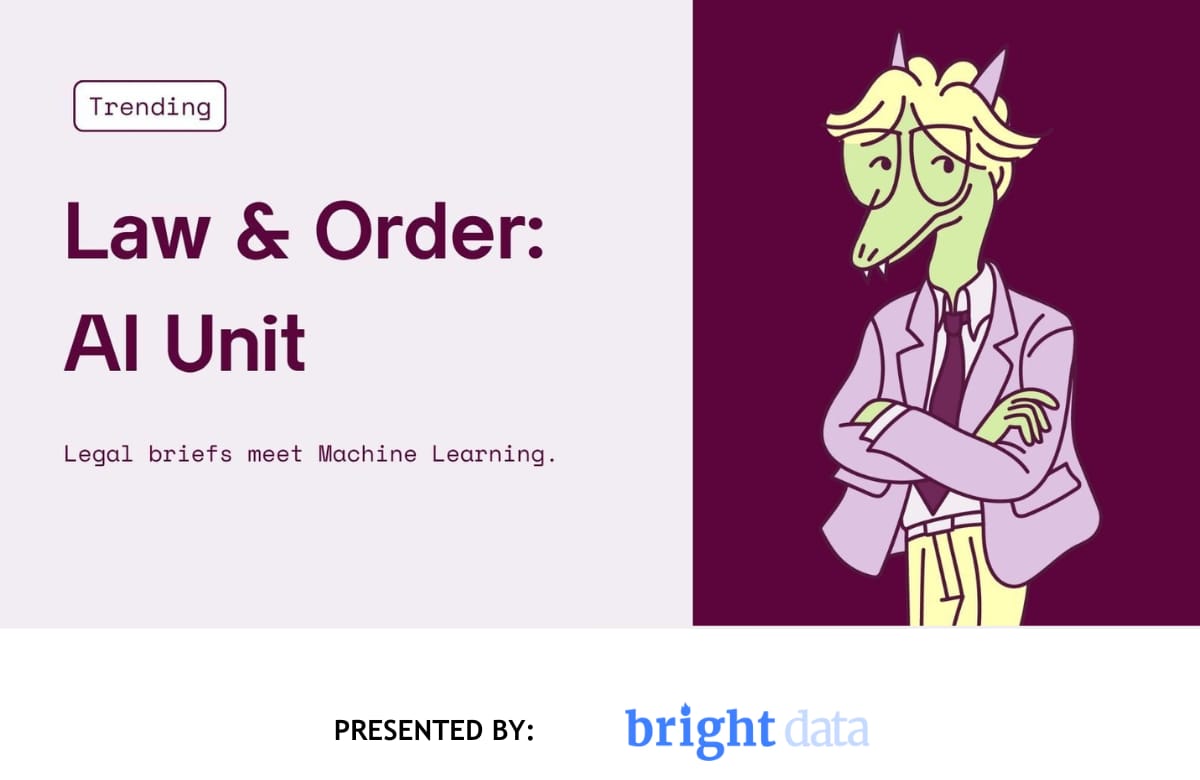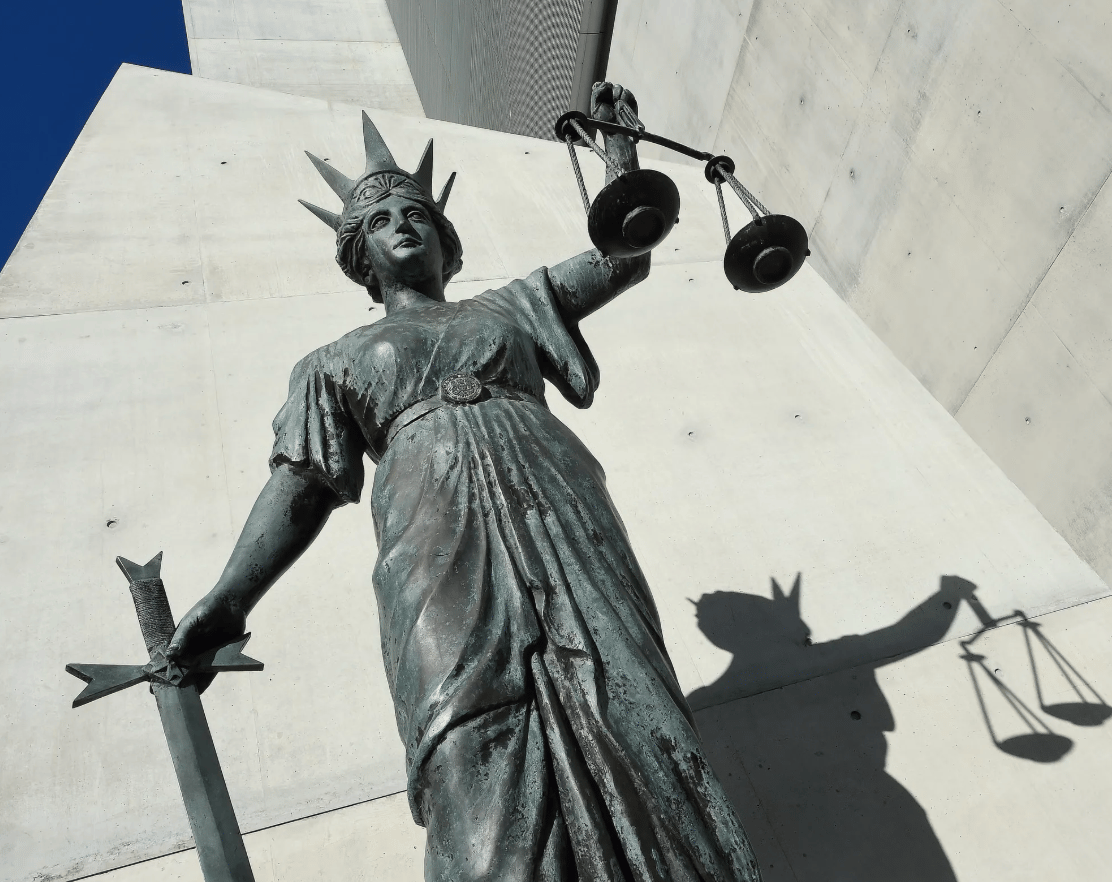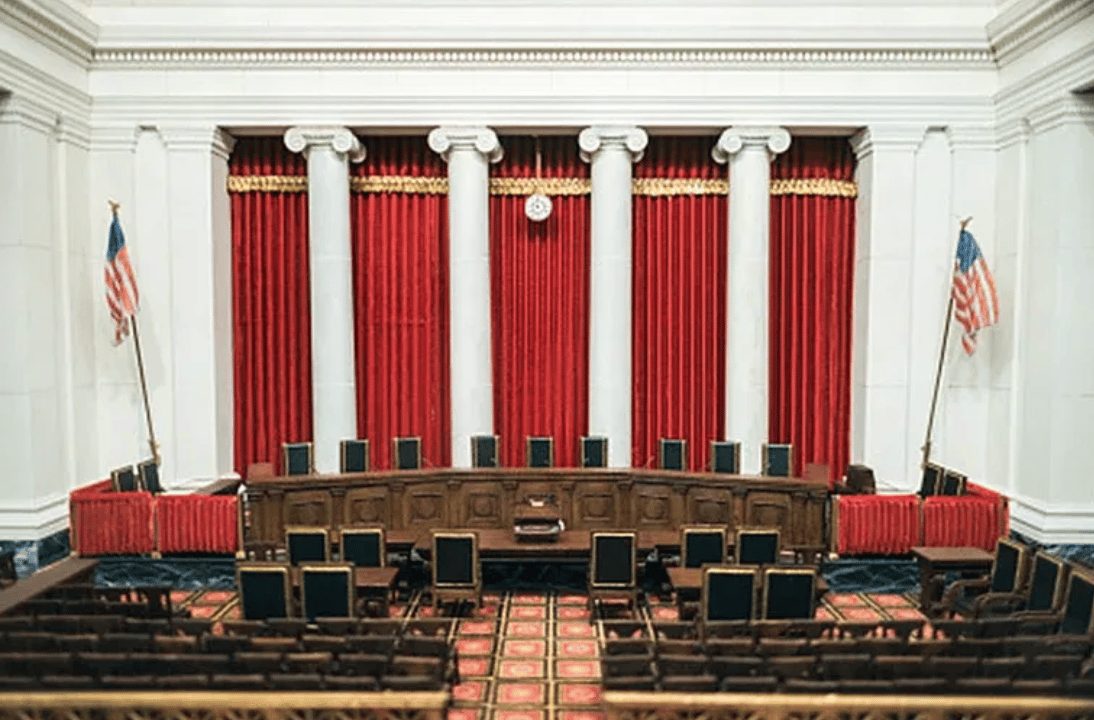- Roko's Basilisk
- Posts
- Law & Order: AI Unit
Law & Order: AI Unit
Plus: Amazon’s AI hub, TikTok filters, EU law update.
Here’s what’s on our plate today:
🧪 Legal AI reshapes courtrooms, careers, and how lawyers bill.
📰 Amazon’s AI hub, TikTok filters, EU law update, all AI-driven.
🛠️ Try 3 legal AI tools: CoCounsel, Spellbook, and DoNotPay.
🗳️ Should AI-generated legal drafts be allowed in court?
Let’s dive in. No floaties needed…

84% Deploy Gen AI Use Cases in Under Six Months – Real-Time Web Access Makes the Difference
Your product is only as good as the data it’s built on. Outdated, blocked, or missing web sources force your team to fix infrastructure instead of delivering new features.
Bright Data connects your AI agents to public web data in real time with reliable APIs. That means you spend less time on maintenance and more time building. No more chasing after unexpected failures or mismatches your agents get the data they need, when they need it.
Teams using Bright Data consistently deliver stable and predictable products, accelerate feature development, and unlock new opportunities with continuous, unblocked web access.
*This is sponsored content

The Laboratory
How AI is forcing the legal system to evolve
The journey of humans from hunter-gatherers to the most successful species on the planet makes for a remarkable tale. This story is fraught with the rise and fall of civilizations that, in turn, were propped up by institutions.
These institutions have played a central role in shaping progress, working in the background as the scaffolding of order.
One of the most overlooked institutions is the legal system. It acts as a structure so constant and familiar that most people rarely think about it, even though it governs nearly every aspect of modern life.
For centuries, law has relied on trained professionals who not only understand rules and precedents but also question their limits to improve the system. Yet this evolution has often been slow, particularly when it comes to adopting new technology.
AI is now forcing the legal profession to evolve faster than at any point in modern history, not only in how lawyers work, but in how firms bill, how courts operate, and how young attorneys build their careers.
The investment flood
According to a Reuters report, legal AI company Clio has raised $500 million in a funding round led by New Enterprise Associates (NEA), valuing the company at $5 billion.
The company’s valuation is part of a broader trend of heavy investment in enterprise software working to develop AI tools for automating legal professional and office work.
Clio’s valuation serves as a great example of interest in automating legal work. The company was founded in 2008 and focuses primarily on streamlining legal work for firms of all sizes. Some of its core functions include managing cases, research, and workflows.
Despite being on the younger side, Clio operates in more than 130 countries. Its rapid rise is reflective of growth in the legal AI market.
How AI is used in the legal field
According to Grand View Research, the market is expected to grow from approximately $1.45 billion in 2024 to $3.90 billion by 2030, at a 17.3% compound annual growth rate.
From a technological perspective, AI's penetration into legal practice spans multiple functions. These include using generative AI for drafting correspondence, brainstorming strategy, and general research. AI helps lawyers streamline legal research, automate contract review, manage large volumes of data during eDiscovery, identify risks, and improve accuracy in due diligence and compliance tasks.
These functions, however, do not translate to a single use case in which technology is being adopted.
The technology operates through several approaches: machine learning and natural language processing enable virtual assistants to help lawyers review and analyze large volumes of documents, contracts, and agreements more efficiently.
Meanwhile, e-discovery software allows lawyers to scan documents using search terms or specific parameters, delivering responses significantly faster than scanning hard copies.
Clio is just one of the many companies trying to bring automation to the legal field. Other major players vying for dominance in this competitive space include names like Thomson Reuters (CoCounsel), LexisNexis (Protégé AI), and Harvey AI.
Alliances and the race for legal AI dominance
The market for AI in the legal field is still in its nascent stage. However, even here, older players have taken the approach of consolidation to capture the market before new entrants upend the existing model.
In June 2025, LexisNexis formed a strategic alliance with Harvey, enabling users with LexisNexis subscriptions to access Lexis content directly within the Harvey interface Artificial Lawyer.
Similarly, Thomson Reuters has partnered with DeepJudge (an AI knowledge-platform startup) to integrate DeepJudge’s technology with its CoCounsel legal AI workflow.
Thomson Reuters has also formed a strategic alliance with Supio AI, which focuses on personal injury and class-action lawsuit automation.
However, while big-ticket mergers and deals are being signed in the field, when it comes to implementation, there are gaps that need addressing.
One of the biggest challenges for AI in the legal field is the persistent generation of false information or hallucinations. And it has already led to real-world consequences.
The real-world consequences of hallucinations
In February 2025, a federal judge in Wyoming threatened to sanction two lawyers at U.S. personal injury law firm Morgan & Morgan for including fictitious case citations in a lawsuit against Walmart.
At the time, Reuters reported that one of the lawyers admitted in court filings that he used an AI program that hallucinated the cases and apologized for what he called an inadvertent mistake. The case stood out due to the involvement of a well-known law firm and a big corporate defendant.
However, it was neither the first nor will it probably not be the last case of AI hallucination.
In June 2023, a federal judge in Manhattan fined two New York lawyers $5,000 for citing cases that were invented by AI in a personal injury case against an airline.
Unlike in other industries, where the problem of hallucination can be detected easily, in legal AI, it can have consequences beyond court fines.
Courts have also gone beyond imposing fines. A California Court of Appeals decision added a new dimension by declining to award attorneys' fees to opposing counsel because of their failure to detect and report their opponent's fake citations, suggesting courts may expect all parties to exercise heightened vigilance.
Some courts are also requiring lawyers to confirm that if they use AI to help write a brief, they have personally checked the AI’s work. For example, the Eastern District of Texas has a rule saying lawyers must certify that they reviewed and verified any content created by a computer.
For professionals working in the legal field, this has added the pressure of ensuring that human oversight is maintained at all times when AI tools are involved.
However, even human oversight represents just one aspect of how legal work is changing. The repercussions of AI go well beyond citations in courtrooms and into career trajectories for young lawyers and how legal firms bill their clients.
Changing career trajectories
Professionals entering the field will now have the opportunity to focus on higher-value activities such as client interactions, case strategy, advocacy, and business development, rather than spending years on repetitive, lower-value tasks.
Beyond work, AI may also upend business foundations of the legal system.
According to Goldman Sachs, 44% of current legal work tasks could be automated by AI. This means that the traditional model of firms that bill by the hour will be rendered moot because work that once took hours can now be done by AI in just minutes.
This has led firms to consider moving toward flat fees or value-based pricing, where clients pay for the result rather than the time spent.
The automation debate
Automating mundane tasks that can otherwise take up valuable time is a no-brainer. However, if we consider the trajectory of AI development where chatbots are making way for agents that perform tasks, the situation gets even more complicated for the legal field.
AI has a strong case to be used in the legal field; it can automate tasks, bring down costs, and even democratize legal knowledge.
However, it also posed a risk of upending the existing business structures, misrepresenting or making up information, and forcing young professionals to rethink their skill development, thereby impacting their prospects.
Since legal institutions constitute the core on which human civilizations rest, both lawyers and courtrooms will have to assess the extent to which tasks can be handed over to AI models.
This would involve asking difficult questions around the extent to which traditional structures should be protected. What would the future of courtrooms look like, and whether institutions are ready to rely on a technology that has yet to prove its reliability and ability to understand and adhere to uncodified human values?
TL;DR
Legal AI investment is booming. Clio just raised $500M.
Tools like Harvey, CoCounsel, and Protégé are reshaping daily legal workflows.
Courts now expect lawyers to verify AI-generated content, or face penalties.
Young attorneys may skip grunt work but face uncertain career paths.


Headlines You Actually Need
Amazon’s AI Megacenter Goes Live: A massive new data hub is now powering Anthropic’s Claude and Amazon’s growing AI ecosystem.
TikTok Adds AI Content Controls: Users can now dial AI-generated content up or down in their feed settings.
EU’s AI Act Triggers GDPR Overhaul: New AI laws are forcing the European Union to rethink core data privacy rules.

Stop overpaying on taxes in 2025.
Let’s be real: Your biggest expense every year isn’t your team or your tools. It’s your taxes, and most high earners pay more than they should.
Written by Ankur Nagpal (who sold his last company for $250M), The No BS Guide to Paying Less in Taxes breaks down the exact strategies wealthy business owners actually use:
Smarter entities
Deduction stacking
Retirement tax hacks
And moves that 17+ more tactics to cut taxes fast
With December 31st fast approaching, now’s the time to act.
*This is sponsored content

Friday Poll
🗳️ Should AI-generated legal drafts be allowed in court? |

Weekend To-Do
CaseText CoCounsel: Explore this AI legal assistant to see how it drafts memos, analyzes contracts, and does legal research. Free trial available for solo practitioners.
Spellbook: A GPT-powered contract review plugin for Microsoft Word that lawyers can actually use. Test it on old docs.
DoNotPay: The infamous ‘robot lawyer’ lets you challenge parking tickets or cancel subscriptions. Just talk to it like ChatGPT.

Rate This Edition
What did you think of today's email? |







